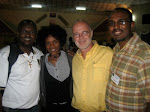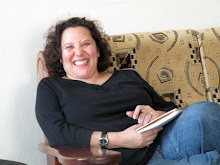 A single wedding is a significant occasion in the life of a couple, but the wedding of 153 couples at once is nothing short of a societal shift! On Saturday I witnessed such an occasion as our Batwa friends took a step toward reclaiming their tradition and stabilizing their community life.
A single wedding is a significant occasion in the life of a couple, but the wedding of 153 couples at once is nothing short of a societal shift! On Saturday I witnessed such an occasion as our Batwa friends took a step toward reclaiming their tradition and stabilizing their community life.We arrived, driving under a flowered garland arch, to the square government building. We were greeted by singing and dancing, as if we were the honored guests! But we have grown fond of their joyful hospitality, so we sway with their songs, stomping feet and whistles. But then we want to move into the building and see what is afoot. We enter the large room and find all 153 couples crammed in this room, moving two by two as they processed forward to sign their official marriage documents. After the signing and fingerprinting (part of the Burundian civil process of documentation) comes the picture taking. And so everyone wants to have their picture taken with the President. (President Nkurunziza is framed, set on a chair draped with the Burundian flag, this is the backdrop of choice!)
 You might notice that the brides are in bright clothes - gifts from our friends in Texas! Each bride received a fabric for the ceremony, but she will use this as a skirt for years to come.
You might notice that the brides are in bright clothes - gifts from our friends in Texas! Each bride received a fabric for the ceremony, but she will use this as a skirt for years to come.
 You might notice that the brides are in bright clothes - gifts from our friends in Texas! Each bride received a fabric for the ceremony, but she will use this as a skirt for years to come.
You might notice that the brides are in bright clothes - gifts from our friends in Texas! Each bride received a fabric for the ceremony, but she will use this as a skirt for years to come. Another interesting thing to note is that 100 of the couples were already living together, already with children. Some are pregnant, many had their babies strapped to their back! There were even a few grandmothers who were, for the day, blushing brides!
 The reality is that as the Batwa people were forced from their land, many of their traditions eroded under the harsh conditions of poverty and discrimination. Marriage was one. So coupes would marry at night, in the dark, avoiding any community accountability. This left women extremely vulnerable. They would often be thrown out with no recourse, no proof of their union and now way to be protected. Some men would take multiple wives, neglecting previous wives. Often families would have open animosity toward one another due to the way their daughters or sisters were treated by other men. This began to ripe the fabric of the community. There was no family stability, no communal accountability, no provision for women if they were turned out. That is why this massive marriage ceremony was so important in the life of this community. This is a way to mend the fabric of this community, to bring some healing to families and some protection for women. Making it official before the local Governor and even the President (who sent his representatives) gives them standing in the community. But this ceremony before God and their community was even more important for a shift in this Batwa society.
The reality is that as the Batwa people were forced from their land, many of their traditions eroded under the harsh conditions of poverty and discrimination. Marriage was one. So coupes would marry at night, in the dark, avoiding any community accountability. This left women extremely vulnerable. They would often be thrown out with no recourse, no proof of their union and now way to be protected. Some men would take multiple wives, neglecting previous wives. Often families would have open animosity toward one another due to the way their daughters or sisters were treated by other men. This began to ripe the fabric of the community. There was no family stability, no communal accountability, no provision for women if they were turned out. That is why this massive marriage ceremony was so important in the life of this community. This is a way to mend the fabric of this community, to bring some healing to families and some protection for women. Making it official before the local Governor and even the President (who sent his representatives) gives them standing in the community. But this ceremony before God and their community was even more important for a shift in this Batwa society.
 This signals a shift in how they see family, how they want to treat one another, how they will relate with one another. I hope that the children present will begin to reclaim their marriage tradition, and that they will begin to see family life in a new way. I pray that these women will be well treated by their husbands, and now protected if the worst happens. I hope the Batwa community is being mended in ways that matter, ways that will make them stronger.
This signals a shift in how they see family, how they want to treat one another, how they will relate with one another. I hope that the children present will begin to reclaim their marriage tradition, and that they will begin to see family life in a new way. I pray that these women will be well treated by their husbands, and now protected if the worst happens. I hope the Batwa community is being mended in ways that matter, ways that will make them stronger.
 Note: Here is Claude surrounded by the Batwa couples. He offered a wonderful encouragement to the couples about love that is faithful, kind and sacrifices for the other.
Note: Here is Claude surrounded by the Batwa couples. He offered a wonderful encouragement to the couples about love that is faithful, kind and sacrifices for the other.
 The reality is that as the Batwa people were forced from their land, many of their traditions eroded under the harsh conditions of poverty and discrimination. Marriage was one. So coupes would marry at night, in the dark, avoiding any community accountability. This left women extremely vulnerable. They would often be thrown out with no recourse, no proof of their union and now way to be protected. Some men would take multiple wives, neglecting previous wives. Often families would have open animosity toward one another due to the way their daughters or sisters were treated by other men. This began to ripe the fabric of the community. There was no family stability, no communal accountability, no provision for women if they were turned out. That is why this massive marriage ceremony was so important in the life of this community. This is a way to mend the fabric of this community, to bring some healing to families and some protection for women. Making it official before the local Governor and even the President (who sent his representatives) gives them standing in the community. But this ceremony before God and their community was even more important for a shift in this Batwa society.
The reality is that as the Batwa people were forced from their land, many of their traditions eroded under the harsh conditions of poverty and discrimination. Marriage was one. So coupes would marry at night, in the dark, avoiding any community accountability. This left women extremely vulnerable. They would often be thrown out with no recourse, no proof of their union and now way to be protected. Some men would take multiple wives, neglecting previous wives. Often families would have open animosity toward one another due to the way their daughters or sisters were treated by other men. This began to ripe the fabric of the community. There was no family stability, no communal accountability, no provision for women if they were turned out. That is why this massive marriage ceremony was so important in the life of this community. This is a way to mend the fabric of this community, to bring some healing to families and some protection for women. Making it official before the local Governor and even the President (who sent his representatives) gives them standing in the community. But this ceremony before God and their community was even more important for a shift in this Batwa society. This signals a shift in how they see family, how they want to treat one another, how they will relate with one another. I hope that the children present will begin to reclaim their marriage tradition, and that they will begin to see family life in a new way. I pray that these women will be well treated by their husbands, and now protected if the worst happens. I hope the Batwa community is being mended in ways that matter, ways that will make them stronger.
This signals a shift in how they see family, how they want to treat one another, how they will relate with one another. I hope that the children present will begin to reclaim their marriage tradition, and that they will begin to see family life in a new way. I pray that these women will be well treated by their husbands, and now protected if the worst happens. I hope the Batwa community is being mended in ways that matter, ways that will make them stronger. Note: Here is Claude surrounded by the Batwa couples. He offered a wonderful encouragement to the couples about love that is faithful, kind and sacrifices for the other.
Note: Here is Claude surrounded by the Batwa couples. He offered a wonderful encouragement to the couples about love that is faithful, kind and sacrifices for the other. When he pointed me out as his wife, the couples in the back stood up to see me. I guess a muzungu wife is still a novelty! These friends wanted us in their wedding pictures... which made us all laugh. But I guess that is something distinctive, having white guests at your wedding. Glad we could oblige... maybe it was our small way of participating in this amazing day! Congratulations to all the happy couples!





















